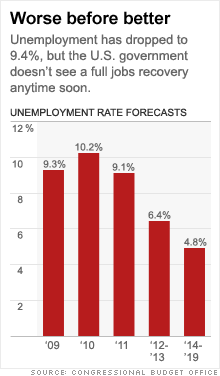Recovery won't improve unemployment
Optimism about the economy may be growing, but don't expect that to mean job growth, too

NEW YORK (Fortune) -- The mood regarding the U.S. economy may be inching, ever so slowly, toward optimism. But don't expect to see much improvement on the jobs front anytime soon. The economy's following a script for a jobless recovery, and unemployment is likely to stay high, if not get slightly worse.
The Congressional Budget Office painted a worsening picture for joblessness on Tuesday: The CBO sees unemployment peaking at 10.4% next year from an average of 9.3% this year, before it falls to 9.1% in 2011.
So how can there be a recovery without job growth to go with it?
To start, companies were unusually quick on the trigger initiating massive layoffs during this downturn. But they're unlikely to be equally zealous about hiring people back, especially since productivity is so high right now. The Labor Department reported that non-farm productivity grew at a 6.4% annual rate in the second quarter, the largest gain since the third quarter of 2003.
This is a direct result of people working harder for fewer hours. The same Labor Department report said hours worked, as reported by businesses, went down 7.6% in the second quarter. And as companies need to ramp up capacity as the economy recovers, they're more likely to roll back their furlough policies and add hours to current workers' schedules than hire new bodies.
All of this means that even as corporate earnings beat analyst estimates -- as we've seen recently -- better numbers won't necessarily translate into any hiring sprees anytime soon.
Another factor: This downturn came as the result of a banking crisis, and the aftermath of these particular crises can be especially drawn out, according to research by the economists Carmen Reinhart and Kenneth Rogoff, who have studied historic examples from other countries. They found that, on average, following a banking crisis, unemployment keeps rising for almost five years -- and the jobless rate goes up about 7 percentage points.
How are we doing? By the latest numbers, the U.S. unemployment rate is up only 5 points from a 2007 low. So there's still more pain to go.
And even if headlines tout a national recovery, the economic picture looks very different depending on where you live. There are huge swaths of the country that have already tipped past the 10% unemployment rate. This map of unemployment rates by state practically shows two different economies: States like California and Michigan have been hit extremely hard with joblessness, whereas the Plains states are relatively unscathed.
"You could have 60 million people doing spectacularly well, and you could have 50 million people doing incredibly badly," says River Twice Research president Zachary Karabell of what the economic recovery could look like. "What do you then say? Do you say we're doing well, or are we doing badly?"
Karabell adds that there could be some people living "in their own version of the Great Depression for a lot of years to come."
Unemployment benefits have already been extended, but it may not be enough. According to analysis by the National Employment Law Project, more than 500,000 of the jobless will run out of their 20 to 53 weeks of benefits by the end of September -- and another million will run out by the end of the year.
The term "jobless recovery" first emerged after the early 1990s recession under President George H.W. Bush. The recession ended in March 1991, but unemployment kept rising up to June 1992 -- a fact that many say was Bush's downfall in the 1992 election. President Barack Obama certainly wants to avoid the same trap, but it may be out of his hands barring a second stimulus plan, which could be politically treacherous.
The economy has shed 6.5 million jobs since the start of the recession. It remains to be seen how many of those jobs will ever come back. ![]()
-
 The retail giant tops the Fortune 500 for the second year in a row. Who else made the list? More
The retail giant tops the Fortune 500 for the second year in a row. Who else made the list? More -
 This group of companies is all about social networking to connect with their customers. More
This group of companies is all about social networking to connect with their customers. More -
 The fight over the cholesterol medication is keeping a generic version from hitting the market. More
The fight over the cholesterol medication is keeping a generic version from hitting the market. More -
 Bin Laden may be dead, but the terrorist group he led doesn't need his money. More
Bin Laden may be dead, but the terrorist group he led doesn't need his money. More -
 U.S. real estate might be a mess, but in other parts of the world, home prices are jumping. More
U.S. real estate might be a mess, but in other parts of the world, home prices are jumping. More -
 Libya's output is a fraction of global production, but it's crucial to the nation's economy. More
Libya's output is a fraction of global production, but it's crucial to the nation's economy. More -
 Once rates start to rise, things could get ugly fast for our neighbors to the north. More
Once rates start to rise, things could get ugly fast for our neighbors to the north. More








